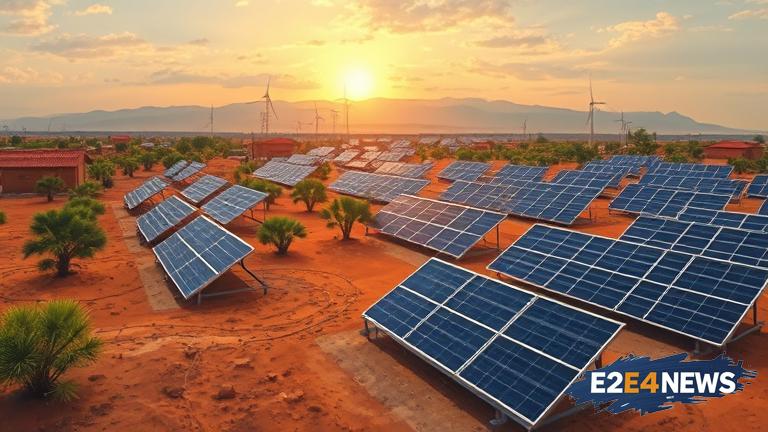The African continent is witnessing a significant shift towards renewable energy, driven by the need to address the pressing issues of energy access, energy security, and climate change. With a growing population and increasing economic activities, the demand for energy in Africa is on the rise. However, the continent’s heavy reliance on fossil fuels has resulted in significant environmental degradation and health problems. In response, many African countries are now exploring alternative energy sources, such as solar, wind, hydro, and geothermal power. Renewable energy offers a cleaner, more sustainable, and cost-effective solution to meet the continent’s energy needs. Several African countries, including South Africa, Egypt, Morocco, and Kenya, have made significant strides in developing their renewable energy sectors. For instance, South Africa has set a target of generating 42% of its electricity from renewable sources by 2030. Egypt, on the other hand, aims to increase its renewable energy capacity to 20% of the total energy mix by 2022. Morocco has also made notable progress, with renewable energy accounting for over 30% of its energy production. Kenya, meanwhile, has emerged as a leader in geothermal energy, with plans to generate 70% of its electricity from geothermal sources by 2025. The growth of renewable energy in Africa is being driven by a combination of factors, including declining technology costs, improved energy storage systems, and innovative financing models. Additionally, international cooperation and investment have played a crucial role in supporting the development of renewable energy projects across the continent. The African Union’s Agenda 2063, which aims to promote sustainable development and energy access, has also provided a framework for countries to work together to achieve their renewable energy goals. Furthermore, the African Development Bank has launched several initiatives to support the development of renewable energy in Africa, including the creation of a $500 million fund to support renewable energy projects. The benefits of renewable energy are numerous, ranging from reduced greenhouse gas emissions and improved air quality to enhanced energy security and job creation. In fact, a recent report by the International Renewable Energy Agency (IRENA) found that the renewable energy sector could support up to 24 million jobs globally by 2030. In Africa, the renewable energy sector is expected to create thousands of new job opportunities, both directly and indirectly, in the coming years. Despite the progress made, however, there are still significant challenges to be addressed, including the need for greater investment, improved infrastructure, and enhanced policy frameworks. Moreover, the integration of renewable energy into the grid and the development of energy storage systems remain key technical challenges. Nevertheless, the future of renewable energy in Africa looks promising, with many countries poised to make significant strides in the coming years. As the continent continues to transition towards a low-carbon economy, it is likely that renewable energy will play an increasingly important role in shaping Africa’s energy landscape. In conclusion, the growth of renewable energy in Africa is a testament to the continent’s commitment to sustainable development and its determination to address the pressing challenges of climate change and energy access. With continued investment, innovation, and international cooperation, Africa is well on its way to becoming a leader in the global renewable energy market.
